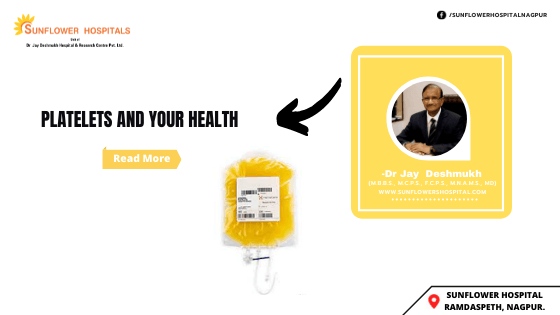What is the function of platelets in our body?
Platelets basically are formed by megakaryocytes located in the bone marrow. Whenever bleeding occurs due to a damaged blood vessel, the platelets come together to form a clot, plugging the tear to stop bleeding. This is a process that has many layers. In the first step, platelets rush to the site wherever blood has started oozing. They start attaching to the site of injury. They also send chemical signals for more help. In the second step, more platelets get the signal and rush to the site, to establish a clot. As more platelets start aggregating, through a coagulation cascade, the fibrin joins the platelets to knit the clot. The scab on a cut is fibrin.
Why certain drugs like aspirin are stopped before Planned anger?
Aspirin interferes with platelet function and may prevent clotting of blood. Hence, it is generally advised to stop it for a period of 4 to 5 days prior to surgery. Similarly, drugs like Ibuprofen or Diclofenac are stopped before surgery
What is a normal platelet count?
The low range could be below 1.5 lacs per microlitre. The normal range would be from 1.5 lacs to 4.5 Lacs and from 5 Lacs to 10 loos comes in an elevated range. Platelets live in the bloodstream for 8 to 10 days.
What is a mean platelet volume?
This is a measure of average size of your platelets. Younger platelets are larger than older platelets. Hence, an elevated MPV means rapid production and release of platelets. A lower MPV means there is a slow-down in production in the bone marrow.
What about platelet distribution width?
This measures the variation in size among platelets. This measurement may Platelets are cells in the blood. They stop bleeding and control blood clotting and thus stop the bleeding effectively. A very low number of platelets can cause spontaneous bleeding, and very high numbers can promote clotting to blood.
Why platelets count are important?
It is significant for your doctor to know your platelet counts before and after surgery, These numbers help them to predict the risk of bleeding or clotting issues. It is significant to track the count if you are undergoing chemotherapy and radiation, as these therapies interfere with platelets production in the bone marrow. Furthermore, it is an essential test in certain infections like Dengue fever helps you to reveal conditions that affect the platelets.
What are the different platelets tests?
Platelets function tests are a series of tests that determine if the platelets are effective enough to form a dot. The time it takes for a dot to dose a wound, how strong a blood clot is, how well platelets aggregate and clump together, and how long it takes for bleeding to stop are essential platelet function tests.
What are the causes of low platelet count?
Chemotherapy or radiation therapy certain viral infections like Dengue or Hepatitis C virus, certain autoimmune disorders like lupus can cause low platelets. In pregnancy, the HELP syndrome includes hemolysis, elevated liver enzymes, and low platelets. It is a type of pre-eclampsia. Certain anticoagulants like Heparin and Warfarin may decrease platelet count. Does idiopathic thrombocytopenia require immune suppression therapy?
What about increasing platelets in our blood?
Primary bone marrow disorders, chronic inflammation in the body, infection, iron deficiency anemia, spleen removal, and certain cancers specifically gastrointestinal cancers, lymphoma, lung, ovarian, and breast cancers can increase platelet counts. A temporary increase may occur after major surgery or trauma. Platelets are tiny cells in our blood with important factions. The main function is to stop bleeding after injury to a blood vessel. Having too little or too many platelets is a health issue. It is especially essential prior to surgery to know your platelet count, Aspirin may prevent proper dotting of blood. This function is influential to prevent clotting in your blood vessels and may help to prevent cardiovascular disease or a stroke.


